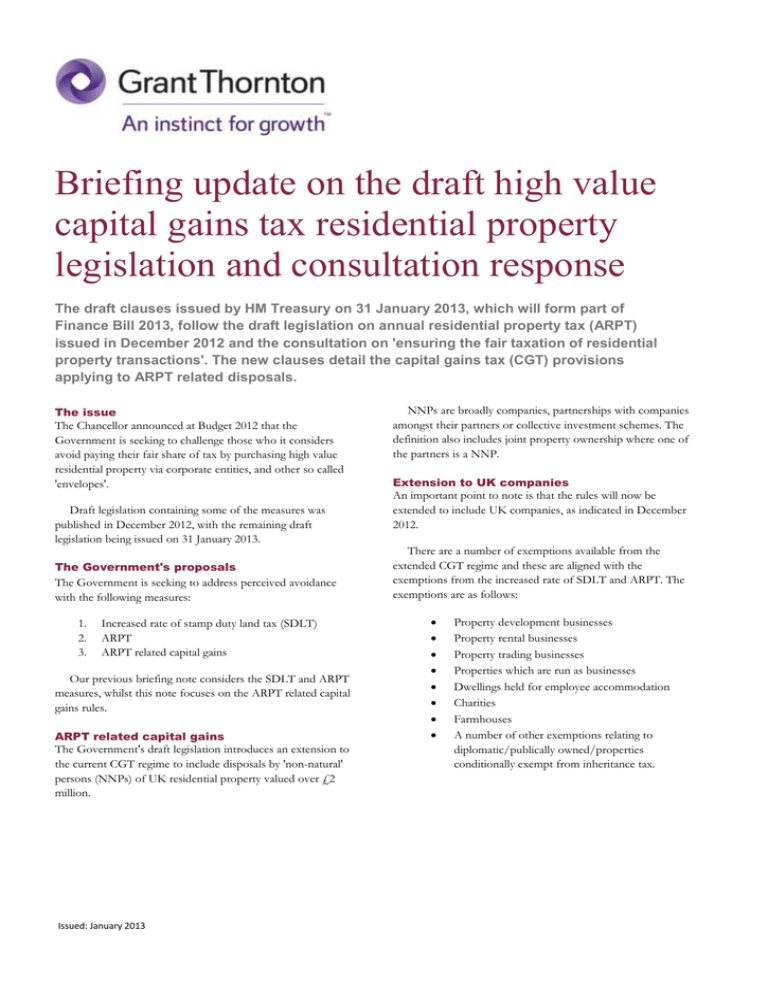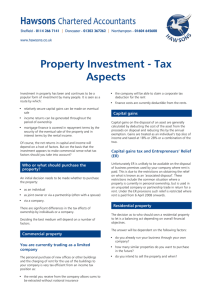
Briefing update on the draft high value
capital gains tax residential property
legislation and consultation response
The draft clauses issued by HM Treasury on 31 January 2013, which will form part of
Finance Bill 2013, follow the draft legislation on annual residential property tax (ARPT)
issued in December 2012 and the consultation on 'ensuring the fair taxation of residential
property transactions'. The new clauses detail the capital gains tax (CGT) provisions
applying to ARPT related disposals.
The issue
The Chancellor announced at Budget 2012 that the
Government is seeking to challenge those who it considers
avoid paying their fair share of tax by purchasing high value
residential property via corporate entities, and other so called
'envelopes'.
Draft legislation containing some of the measures was
published in December 2012, with the remaining draft
legislation being issued on 31 January 2013.
The Government's proposals
The Government is seeking to address perceived avoidance
with the following measures:
1.
2.
3.
Increased rate of stamp duty land tax (SDLT)
ARPT
ARPT related capital gains
Our previous briefing note considers the SDLT and ARPT
measures, whilst this note focuses on the ARPT related capital
gains rules.
ARPT related capital gains
The Government's draft legislation introduces an extension to
the current CGT regime to include disposals by 'non-natural'
persons (NNPs) of UK residential property valued over £2
million.
Issued: January 2013
NNPs are broadly companies, partnerships with companies
amongst their partners or collective investment schemes. The
definition also includes joint property ownership where one of
the partners is a NNP.
Extension to UK companies
An important point to note is that the rules will now be
extended to include UK companies, as indicated in December
2012.
There are a number of exemptions available from the
extended CGT regime and these are aligned with the
exemptions from the increased rate of SDLT and ARPT. The
exemptions are as follows:
Property development businesses
Property rental businesses
Property trading businesses
Properties which are run as businesses
Dwellings held for employee accommodation
Charities
Farmhouses
A number of other exemptions relating to
diplomatic/publically owned/properties
conditionally exempt from inheritance tax.
Tax rate
Other points to note
The rate at which ARPT related CGT will be charged to NNPs
affected by these rules is 28%, with a tapering of gains where
the residential property is worth just over £2 million. This is to
remove any incentive to sell a residential property at
undervalue to fall below the £2 million threshold, thereby
avoiding the tax altogether.
There is a lack of clarity regarding some of the proposed
exemptions under the ARPT rules that were published in
December 2012. This is unfortunate because these exemptions
have been effectively imported into the new ARPT related
CGT provisions. The rules in relation to those engaged in
farming related activity also require clarification.
ARPT related CGT will only arise on gains accruing after
the introduction of these rules, resulting in an effective
rebasing for CGT purposes at 5 April 2013.
Current structures
The rebasing to market value as at 5 April 2013 will be
automatic. Whilst any gain prior to 6 April 2013 should fall
outside of the new ARPT related CGT rules, this will not
preclude the operation of any other anti-avoidance provisions
in relation to gains attributable to the period prior to 6 April
2013.
It is possible for an irrevocable election to be made to
disapply the rebasing. Whilst certain aspects remain unclear, it
appears that the intention is that gains will be calculated by
reference to the original base cost of the property rather than
the rebased value. This may be relevant where the property has
decreased in value between purchase and 5 April 2013.
The calculation
The draft legislation sets out the detail of how to calculate the
new ARPT related CGT charge. These will apply by reference
to a period where the residential property falls within the
ARPT regime. The calculation apportions the charge between
phases when the residential property falls within the ARPT
rules and phases when it does not.
Losses
The new legislation also includes provisions on how to treat
capital losses arising on ARPT related disposals. It is intended
that ARPT related losses will be subject to a separate, but
parallel, regime. These will fall outside of the normal CGT or
corporation tax rules. This means that ARPT related losses will
be ring fenced and can only be set against ARPT related gains
either in the same tax year or in the future.
Anti-fragmentation
The draft legislation also contains anti avoidance provisions
aimed at preventing the avoidance of these new rules through
the fragmentation of a single asset into a number of less
valuable assets.
Valuation
It will be necessary to obtain a valuation of the property as at 5
April 2013 to calculate the gain arising when the property is
eventually sold.
The new ARPT related capital gains changes will take effect
from 6 April 2013. This leaves a very short time frame for
taxpayers to assess the tax efficiency of their structures before
the proposals come into force. The impact of these rules is
wide ranging and particular care should therefore be taken
when considering changes to current structures and the
creation of new ones.
The current proposals do not contain any provisions to
soften the effect of the tax where UK residents occupy
properties held by NNPs. Any UK residents occupying such
properties currently held in this way should seek advice.
In addition, there are no transitional provisions to either
limit the charge to tax under existing legislation or to relieve
any double charges in relation to steps taken prior to 6 April
2013 to remove high value residential properties from their
corporate envelopes. Again, care should be taken and advice
should be sought before making any changes.
Response
Grant Thornton will be responding to the Government's draft
Finance Bill clauses and the CGT proposals. We would be
grateful for your input.
The consultation closes on 22 February 2013, so please let
us know your thoughts in good time for us to include them in
our response.
Further information
Further information on ARPT and our previous briefing paper
can be found on the Grant Thornton Autumn Statement
pages. If you would like to discuss the draft legislation, or how
these new rules could affect you, please feel free to contact one
of our experts using the details below.
Contact us for further information:
Name
Title
T
E
© 2013 Grant Thornton UK LLP. All rights reserved.
'Grant Thornton' means Grant Thornton UK LLP, a limited partnership. Grant Thornton UK LLP is a member firm of Grant Thornton International Ltd
('Grant Thornton International'). Grant Thornton International and the member firms are not a worldwide partnership. Services are delivered by
member firms independently. This publication has been prepared only as a guide. No responsibility can be accepted by us for loss occasioned to any
person acting or refraining from acting as a result of any material in this publication.
www.grant-thornton.co.uk



